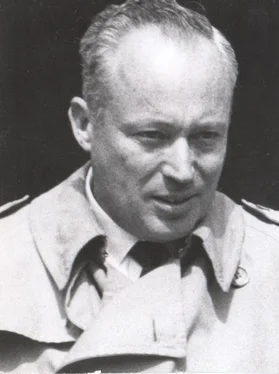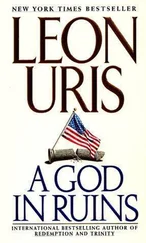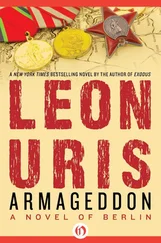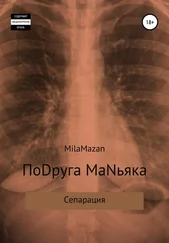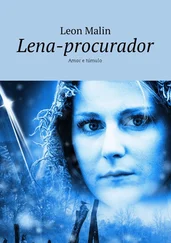Samson Ben Horin, commander of the Jabotinski company of Revisionists, had remained outside the jurisdiction of Joint Jewish Forces, but the events of the day compelled him to look upon Eden’s army with a new respect. He dispatched a runner to Eden with an offer to keep runner contact with their bunker and join in limited cooperation.
Simon soon found an assignment much to Ben Horin’s liking.
On the last day of January, Samson Ben Horin led a combined company, half Revisionists, half Joint Forces, through the sewer pipes under the wall into the Aryan side. He picked the hour of the Vistula’s lowest tide, when the sewage was only knee-deep. Using Simon’s engineer’s map of the sewer system, he had only a mile to negotiate. Ben Horin’s party came to a stop beneath a manhole close to Bank Square near the Ministry of Finance.
Three Aryan side contacts waited. One was dressed as a sewer worker, the second sat in the driver’s seat of a parked teamster wagon, and the third watched at the corner in a position to observe the German Exchange Bank on Orla Street.
It was the day before payday for the German garrison. At precisely noon an armored truck from the ministry would stop to deposit part of the payroll at the Exchange Bank.
The watchman signaled the arrival of the armored truck.
The horse-drawn wagon moved from the curb and stopped beside the manhole. A long ladder was taken from it and set down in the sewer. Samson Ben Horin led his party out of the sewer. They scattered with startling rapidity so that both ends of the block-long Orla Street could be sealed.
A dozen German soldiers formed a guard around the armored truck before the bank. They passed the money sacks in.
Samson Ben Horin arched a homemade matzo-ball grenade. It landed at the right front tire of the truck.
Nuts and bolts flew everywhere, ripping into the bodies of the Germans.
A second grenade.
A third.
Half of the Germans were on the ground, groveling with iron in them. The truck was disabled, but guards inside fired back.
A fire bottle splattered against the side of the truck, igniting into flame and driving the defenders out.
Samson Ben Horin signaled for his men to converge. They pressed in from both ends of Orla Street. The Germans were pinned against the wall and the flaming truck. A few plunged into the bank for safety.
Half of the raiders grabbed every money sack in sight. The other half pushed into the bank and forced the vaults open. Within eight minutes of the time they had come from the sewer, they disappeared the same way with more than a million zlotys.
Simon Eden referred to the actions as practical field training to teach his army that the invulnerable enemy was indeed vulnerable.
Within a week after Andrei’s ambush at Niska and Zamenhof streets, which signaled the uprising, Joint Jewish Forces had purged the ghetto of collaborators, added millions to their treasury, controlled the streets, confiscated tons of food, wrecked the two major slave-labor factories, and freed the workers.
There were two large jobs left. The Jewish Militia, who cowered in their barracks, and the Civil Authority. The act of mere vengeance: doing away with the Jewish Militia was overruled by more practical considerations of settling with the Jewish Civil Authority.
On February 1, 1943, a hundred fifty men and women of Joint Forces surrounded the Jewish Civil Authority building at dawn. Simon Eden broke down the doors and entered with fifty more Fighters.
From his office on the third floor Boris Presser watched the scene below with Marinski, his assistant.
“Get into the outer office,” Presser said quickly. “Stall them. Keep them out of here.”
Presser sat behind his desk and tried to think. Every day he had been phoning Rudolph Schreiker to report on the rampaging of the Joint Forces. Murder in the streets, assassinations, looting, extortion. Boris was positive the actions would result in a murderous reprisal from the Reinhard Corps, but another day passed and another and another and nothing happened.
Each day his people cringed in the Civil Authority building with their families, trying to push him into a decision. Boris didn’t like decisions or involvements. He had made a career of evasiveness. The Germans had always told him what to do. He did it. He had the ready-made excuse of throwing up his hands and saying, “What could I do?”
Marinski bolted into the room, crying semi-coherently, “Stop them! They’re taking our families!”
“Stop shouting. Shouting will do no good. Get out there and delay Eden from coming in.”
Boris locked the door and ran to the phone. First Schreiker, then the Militia. The line was dead. He clicked it desperately. Nothing. Presser rubbed his throbbing temples and slipped to the window. Women and children, families of the Civil Authority, were being prodded out into the street at gun point. A ruckus in the outer office. Authoritative knocks at his door.
Stall ... play for time ... debate ... stall.
He unlocked the door. Simon Eden stood before him. Black-eyed; long, wiry frame; intense. Simon hovered over the smaller man, shoved the door wide, and looked around the office. He stepped inside the room and closed the door behind him, shutting out Marinski, who was too terrified to protest the abduction of his wife and daughter.
Boris backed up, bringing everything within him to the fore to maintain control and not show his fear. “I protest this humiliation of the Civil Authority,” he said.
Simon ignored him; his eyes showed almost boredom.
“You have no right to barge in here and kidnap our families. You have no right to treat us like collaborators.” Boris prodded to find a point of argument.
Simon would not argue. “History will pass judgment of the Civil Authority,” he said dryly.
Careful, Presser said to himself, careful. Don’t anger him. “You must realize,” Boris fenced, “that I have no personal authorization to grant you recognition.”
“Just recognize what comes out of the end of this muzzle. It is quite simple. We have your families. We want your treasury.”
Beads of perspiration popped out on Boris Presser’s upper lip. To refuse would be to admit that he was truly a puppet of the Germans, for in fact Joint Jewish Forces now represented the authority in the ghetto. But if he did recognize Eden, the Germans would eventually punish him when they returned. Boris was in a vise. He opened his arms benevolently. “Surely, Simon, as a man who knows organizational structure, you are aware that I do not control our very insignificant treasury. I have no way of acting.”
“Find a way,” Simon interrupted. “In an hour we shall deposit three corpses at the doorsteps of this building. One will be a member of your own family. Each hour thereafter, three more hostages will be shot until you deliver two million zlotys to Joint Forces.”
Marinski, eavesdropping, burst in, “Give him the damned money!”
Boris was dying to drink a glass of water to relieve his parched throat, but he knew that if he lifted a glass his hand would spill it with trembling. “Let me discuss this with my board,” Boris said, continuing the role of a reasonable man. “There are many touchy legal problems. Mind you, I am certain they can be solved, but this is rather sudden. Let us thrash it out. We will come up with a suitable compromise.”
Simon Eden looked down at him with final disgust. “You have no alternative,” he said, and before Boris Presser could speak again, Simon left.
An hour later the two million zlotys were turned over to Simon, half from the denuded treasury and half confiscated as ransom from personal fortunes.
“I was in favor of dumping you at the Stawki Gate with Piotr Warsinski,” Simon said impassively. “But Alexander Brandel is a dreamer. He believes in the poetic justice of making you and your people burrow into the ground and live like rats ... as the rest of us have.”
Читать дальше
